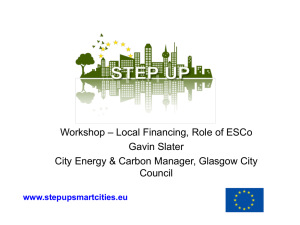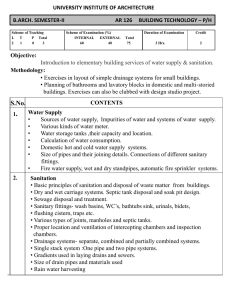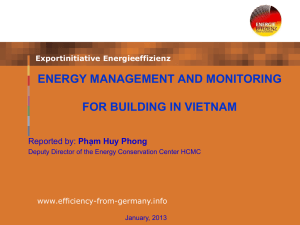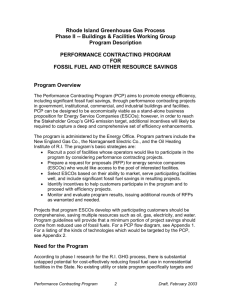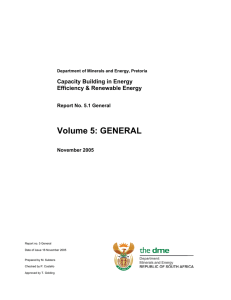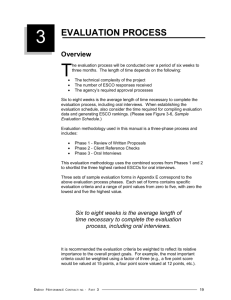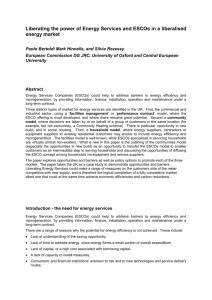Service
advertisement
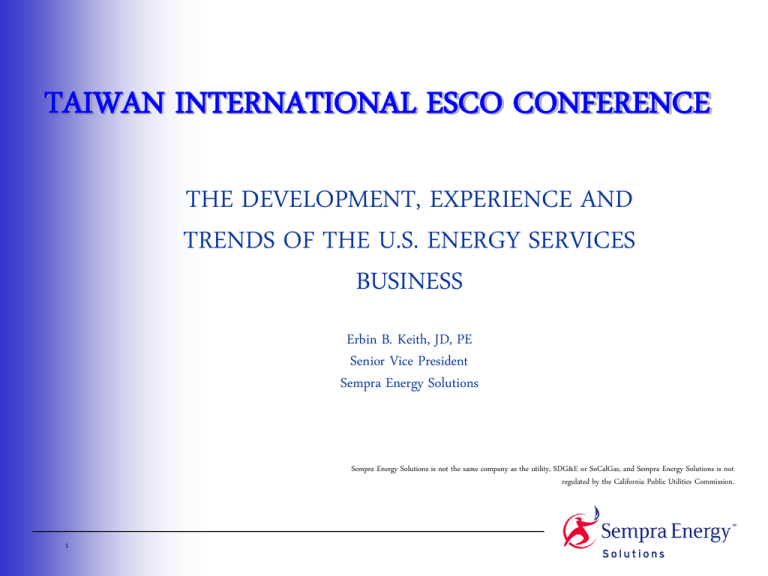
TAIWAN INTERNATIONAL ESCO CONFERENCE THE DEVELOPMENT, EXPERIENCE AND TRENDS OF THE U.S. ENERGY SERVICES BUSINESS Erbin B. Keith, JD, PE Senior Vice President Sempra Energy Solutions Sempra Energy Solutions is not the same company as the utility, SDG&E or SoCalGas, and Sempra Energy Solutions is not regulated by the California Public Utilities Commission. 1 AGENDA AGENDA Sempra Energy Solutions U.S. Energy Services Providers Services provided by U.S. ESCOs Common Projects Implemented by U.S. ESCOs ESCO Development & Market Issues 2 AGENDA SEMPRA ENERGY SOLUTIONS Sempra Energy Solutions U.S. Energy Services Providers Services provided by U.S. ESCOs Common Projects Implemented by U.S. ESCOs ESCO Development & Market Issues 3 Infrastructure Services Physical Supply Information Services Risk Management Operations & Maintenance Flexible Pricing Load Management Engineering & Construction Capital Upgrades 4 Energy Efficiency U.S. ENERGY SERVICES PROVIDERS Independent ESCOs — Traditional ESCOs — Contractors — Consultants — Facilities Managers Utility-Affiliated ESCOs Equipment Manufacturer-affiliated ESCOs Trends — Consolidation/acquisition of the independent ESCOs — The emergence of utility affiliated ESCOs — Failure of early participants as an integrated retail energy provider — Expansion of ESCO services and measures implemented 5 KEY U.S. END-USERS (ESCO MARKET SECTORS) Historical — Federal Government — Institutional Colleges and Universities K-12 State and Local Government Hospital Trends — Industrial — Commercial 6 SERVICES PROVIDED BY ESCOs Traditional Services — Energy Audits — Project Engineering — Project/Construction Management — Project Financing — Operations and Maintenance — Measurement and Verification Expanded Services — Water Conservation — Asset Minimization — Energy Information — Environmental — Energy Commodity/Commodity Risk Management — Substation Work (e.g., voltage upgrades) 7 COMMON ESCO PROVIDED ENERGY CONSERVATION MEASURES Historical — Lighting Retrofits/Ballast Disposal — HVAC Retrofits — Building Control Systems — Motors and Drives — Chiller and Boiler Upgrades Trends — Thermal Storage/Load Shaping — Generation Efficiency Improvement — On-site Power Generation (Distributed Generation, CHP, Cogeneration) — Power Quality — Industrial Processes (e.g., compressed air systems) 8 ESCO PROJECT EXAMPLES 9 Albany Medical Center Albany, NY 1994 U.S. Department of Energy Award 1993 New York Governor’s Energy Awards • 2.2 Million Square Feet • 20 Buildings • $7.7 Million Installed Cost • $1.3 Million Annual Energy Savings Comprehensive Approach at Albany Medical ECM Technologies • Lighting retrofit-22,000 fixtures • 1000-point energy mgmt control system installation • 1200-ton central plant expansion • Replace air-cooled & DX air conditioning • with distributed chilled water • High-efficiency motors • Boiler plant upgrade • Heat recovery • Expand chilled water loop to additional buildings • VSD’s on AHU’s and pumps • Domestic hot water conversions • 1000 energy-efficient windows • Chiller installations • Freon transfer, storage & recovery installation Louisiana State University (LSU) Baton Rouge, Louisiana 1995 Association of Energy Engineers Project of the Year •100 Buildings • Linked to New Central Plant • $18,650,000 Installed Cost • $4,300,000 Annual Energy Savings • $1,000,000 Annual Maintenance Savings New Central Plant at LSU ECM Technologies • 5000HP Gas-fired turbine powered by jet engine to drive a 6300 ton chiller and produce steam with a heat recovery boiler • 4.5 miles underground chilled water piping • 8000-ton cooling tower • 2000-point energy management control system + LSU-added 18,000 points • 2.25 miles underground fiber optic cable • Variable speed pumping • Relocate boiler controls to new central plant 13 Houston Independent School District ESCO 1.0 Project 2.9 Million Sq. Ft. • Thermal Storage System Installations • Energy Management Control Systems • Lighting Upgrade - 24,000 Fixtures • New Central Plant @ Administration Complex Facility Size: Project Cost: Projected Savings: 21 schools + Admin. Complex $12.75 Million $1.4 Million Annually Comprehensive Approach at Houston Independent School District ECM Technologies 24,000 Fixture Lighting Retrofit — Ballasts, Bulbs, Reflectors, Lighting Controls 17 Thermal Energy Storage Systems — Ice and Chilled Water New Central Plant for Administration Complex Energy Management Control Systems Chiller Replacement Solar Screens Variable Speed Drives on Air Handlers & Chilled Water Pumps Power Factor Correction Window Tinting Conversion DX to Chilled Water Piping Associated With Connection to Central Plant Glycol to Water Heat Exchanger for Glycol Isolation Duct Dampers Three 500-Ton Chillers 800,355 Gallon Chilled Water Storage Tank HISD CENTRAL PLANT ICE STORAGE TANKS District-wide: 17 Thermal Storage Systems totaling over 111,000 ton-hours STATE UNIVERSITY OF NEW YORK (SUNY) Buffalo Campus Amherst, New York 1997 AEE Energy Project of the Year 1996 EUN Certificate of Merit College/University Sector ECMs Installed: •Campus-wide lighting retrofit •4000 point energy management system •High efficiency motor replacement •Variable speed drives •Steam, hydronic hot water & domestic hot water boilers Facility Size: 5.5 Million sq.ft.//60+ buildings Project Value: $17,213,000 Annual Savings: $1,600,000 STATE UNIVERSITY OF NEW YORK (SUNY) Cortland Campus Cortland, New York 1996 EUN Energy Project of the Year College/University Sector ECMs Installed: •Campus-wide lighting retrofit •25,000 fixtures •3000-Point energy management • control system •Chiller & cooling tower replacement •Building envelope sealing & •insulation •Gas-fired steam & hot water boilers •Variable speed drives on AHUs, exhaust fans, pumps •High efficiency motors Project Value: Facility Size: Annual Savings: $9,600,000 2,500,000 sq. ft. in 50 buildings $1,190,000 BAYLOR UNIVERSITY Waco, TX In Commissioning Technologies Installed •Modify Central Plant Piping For Greater Operational Flexibility •4500 Tons Total Replace Two 25-Year-Old Chillers, Add One New •Retrofit 50,000 Light Fixtures •Expand Energy Management Control System Facility Size: 3,736,719 Sq. Ft. 90 Bldgs Project Value: $15,000,000 Projected Annual Savings: $1,630,000 HILL AFB Utah •1400 Buildings •14 Million Square Feet •Fast Track Implementation •Structured Around Multiple Task Orders •Comprehensive Energy Conservation Technologies •$20 Million Total Construction Value •EUN’s 1996 Federal Project of the Year Hill AFB ECM Technologies • High Efficiency Chillers • Cooling Towers • Variable Speed Pumps and Fans • High Efficiency Electronic Ballasts, T8 Lamps, Metal Halides, Sulfur Lighting • Energy Management Control Systems • Economizer Controls Statue of Liberty/Ellis Island National Monuments New York, NY Project includes: installation of Ener gy Management Control System, variable speed drives and lighting improvements to over 4000 fixtures. Project Value: $1,060,000 Facility Size: 350,000 sq. ft. Projected Annual Savings: $172,000 Hampden County Courthouse Hall of Justice Springfield, MA ECMs Installed: •Electric to gas conversion, increase boiler plant size •Electric to hot water reheat in ductowrk •New chiller plant •Upgrade and expand energy management control system •6000-fixture lighting retrofit •New transport gas contract Facility Size: Project Value: Projected Annual Savings: 2 bldgs.; 300,000 sq. ft. $2,798,000 $340,000 State of New York Ten Eyck Building Albany, NY Technologies Installed • Lighting Retrofit • Centrifugal Chillers • “Free Cooling” System • Closed Circuit Evaporative Towers • Premium Efficiency Electric Motors • Expansion of Existing Computerized Energy Management Control System Project Value: Facility Size: Annual Savings: $2,200,000 300,000 sq. ft. 16-story building $291,453 City of Buffalo Buffalo, NY Technologies Installed •Upgrade Over 18,000 Lighting Fixtures •Installation of High Efficiency Motors •800-h.P. Variable Speed Drive •Improved Temperature Control Project Value: Facility Size: Annual Savings: $2,637,000 70 buildings located throughout the city $512,000 Harris County Central Plant Houston, TX Facility Size: Serves 7 Current Plus 3 Future Buildings Project Cost: $17.5 Million Projected Savings: $1.0 Million Annually Technologies Installed • Six 1200-Ton Chillers • Three 50,000 PPH Boilers • Six 3600 GPM Cooling Towers • Energy Management System • Variable Speed Drives on Pumps • Separate Electrical Switchgear Room • Control Room • Water Treatment Equipment Austin Airport Central Plant Austin, TX Technologies Installed • Four Chillers Totaling 3000 Tons Cooling • Three Hot Water Boilers Totaling 900 HP • 1.5 Million Gallon Thermal Storage Tank • Three-Cell 9339 GPM Cooling Tower • Primary/Secondary Variable Pumping Systems Sempra Energy Services Role: Design & Construct Facility Size: 500,000 Sq. Ft. on 4 Levels Project Value: $5,087,586 Jefferson County Government Complex Louisville, KY TECHNOLOGIES INSTALLED •Replace 55-year old central system with 25 modular boilers • 1000-point computerized energy control system. • Upgrade over 2000 lighting fixtures Project value: Facility Size: Annual Savings: $2,500,000 901,295 sq. ft. $512,972 Century City Central Plant Los Angeles, California Service - Provides chilled water and steam services to 10 million square ft. Diversity of Load - Includes the Theme Towers, Century Plaza Hotel, Shubert Theatre, ABC Entertainment Center, Century City Hospital, Century Park Condominiums Capital Investment - Expanded 22,000-ton chilled water plant to 27,000-tons in 1998 Reliability - 24 hours per day / 7 days per week, year-round uninterrupted coverage since 1984 30 IEMS - Venetian Resort, Las Vegas Financed $70MM of energy facility infrastructure including the central plant, HVAC air-side, energy monitoring and control system, back-up power generation, and UPS 15,500-ton chilled water plant 9,200,000 square feet, 6000 rooms Turn-key operating and maintenance for entire resort Will have 60 employees dedicated on-site to provide 24X7 service when fully staffed, 80 employees when construction is complete Energy procurement services 31 Building Technical Services STAPLES Center, Los Angeles 2,500-ton chilled water plant 260-ton ice making equipment 901,000 sqft Turn-key operation and maintenance of the entire energy infrastructure Image of the Staples Center by the Los Angeles Kings 32 THE U.S. ESCO DEVELOPMENT AND MARKET ISSUES Market Drivers Federal Legislation and Executive Orders — U.S. Government owns or operates over 400,000 buildings and has an energy bill of $4.2 billion/year. The Energy Policy Act of 1992 (EPACT) and subsequent executive orders have mandated significant reductions in energy consumption at Federal buildings and provided the legislative framework for Energy Savings Performance Contracting (ESPC). Trend toward outsourcing — Building owners are seeking a competitive advantage by outsourcing non-core functions to third-party “experts.” DMS Programs — Demand-side management programs created as part of deregulation process spurs the implementation of energy services projects. Deregulation — Most of U.S. population is now facing a deregulated power market in the next five years. This is forcing the market to deal with retail commodity providers and developing a purchasing strategy that includes energy services projects. However, these programs usually provide less incentive than the Integrated Resource Planning DSM programs 33 Performance Contracting — Performance contracting has expanded the development of the ESCO industry by attracting customers that otherwise would not invest in energy efficiency projects because of the cost and risk associated with the projects. Readily available financing sources — Low cost capital is readily available, particularly to the tax-exempt customer. The acute need for infrastructure renewal in the HUGS (Hospital, University, Government, and School markets. — This need along with favorable statutory authority and low cost (tax-exempt) financing has driven the U.S. performance contracting market. Transparent pricing — Transparent or “open book” pricing has opened the market but narrowed margins. Environmentally Driven Energy Projects — Important environmental issues and liabilities are driving some energy projects (e.g., CFC issues in chillers, emissions in boiler/power plants, PCBs in lighting ballast's). 34 Restraints/Challenges Lack of customer education — Customers are confused about a deregulated power market and the many options they face DSM Programs — Deregulation has all but ended old style Integrated Resource Management DSM programs. Newer programs generally provide lower incentives. Deregulation/apathy — Deregulation has created unreasonable expectations and a wait-and-see attitude in many customers. Difficult business development process — The sales cycle for energy services has traditionally been 12-24 months State and local government legislation — Many states have favorable legislation for performance contracting and state and local buildings. 35 New ESCO market participants — Inexperienced new participants have created confusion the market Utility affiliates — Utility affiliate ESCOs bringing local brand/influence/experience to gain competitive advantage over non-utility ESCOs Lack of qualified energy professionals — Employment market lacks experienced energy professionals Negative experience by customers — Early market drivers (e.g., tax incentive driven projects in the 1980s) and project or ESCO failures negatively impact market. Strong U.S. economy — In a strong economy, energy cost savings are less of a factor to end users. 36 Historical lack of participation of the commercial and industrial end-use sectors. Some of the “excuses” for lack of participation: — Sector already pays low unit price for energy — Energy costs is a small part of the product cost — Product considerations override energy considerations — Sector applies product style rate-of-return analysis to energy projects. — Sector feels it has internal resources to implement projects — Sector has internal capital to implement energy projects — Commercial end-use sector makes use of triple-net leases that don’t provide an incentive to implement energy projects. 37

